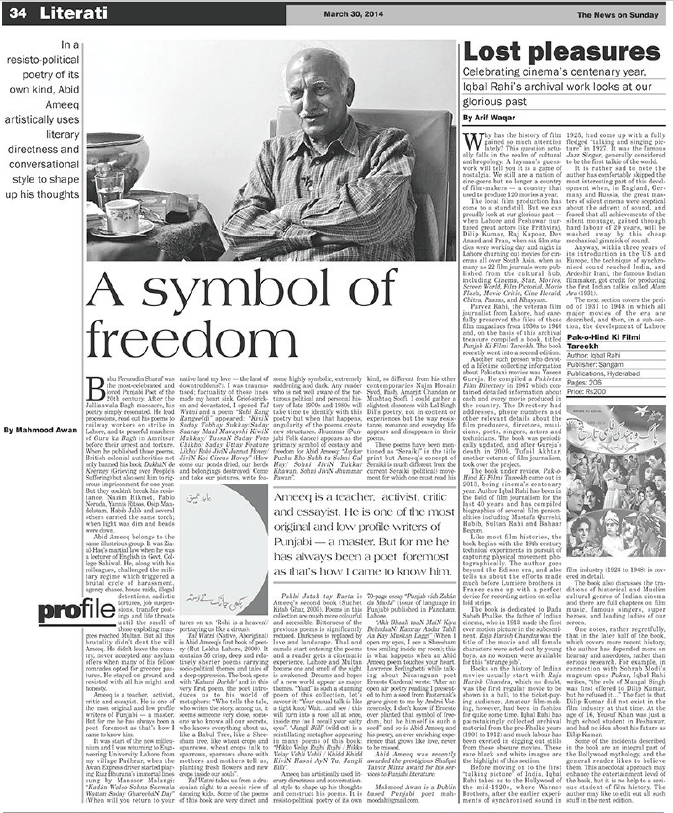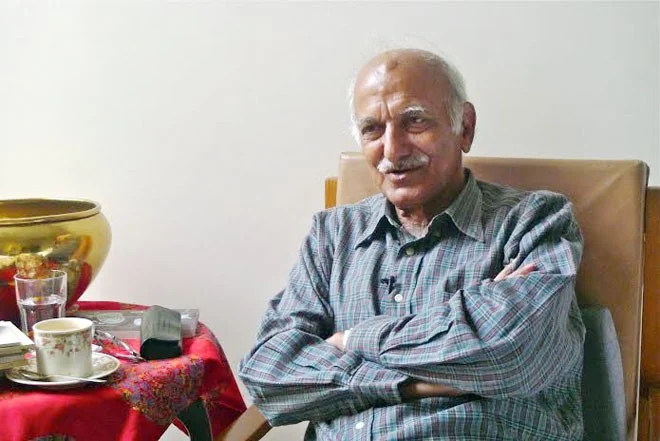Babu Ferozudin Sharaf was the most-celebrated and loved Punjabi Poet of the 20th century. After the Jallianwala Bagh massacre, his poetry simply resonated. He lead processions, read out his poems to railway workers on strike in Lahore, and to peaceful marchers of Guru ka Bagh in Amritsar before their arrest and torture. When he published those poems, British colonial authorities not only banned his book DukhãN de Keerney (Grieving over People’s Suffering) but also sent him to rigorous imprisonment for one year. But they couldn’t break his resistance. Nazim Hikmet, Pablo Neruda, Yannis Ritsos, Osip Mandelstam, Habib Jalib and several others carried the same torch; when light was dim and heads were down.
Abid Ameeq belongs to the same illustrious group. It was Zia-ul-Haq’s martial law when he was a lecturer of English in Govt. College Sahiwal. He, along with his colleagues, challenged the military regime which triggered a brutal cycle of harassment, agency chases, house raids, illegal detentions, sadistic tortures, job suspensions, transfer postings and life threats until the smell of those exploding mangoes reached Multan. But all this brutality didn’t dent the will Ameeq. He didn’t leave the country, never accepted any asylum offers when many of his fellow comrades opted for greener pastures. He stayed on ground and resisted with all his might and honesty.
Ameeq is a teacher, activist, critic and essayist. He is one of the most original and low profile writers of Punjabi — a master. But for me he has always been a poet foremost as that’s how I came to know him.
It was start of the new millennium and I was returning to Engineering University Lahore from my village Padhrar, when the Awan Express driver started playing Riaz Bhurana’s immortal lines sung by Mansoor Malangi: “Kadãn Walso Sohna Sanwala Wattan Saday GhareebãN Day” (When will you return to your native land my love — the land of downtroddens?). I was traumatised; factuality of those lines made my heart sink. Grief-stricken and devastated, I opened Tal Watni and a poem “Rohi Rang Rangeeldi” appeared: “KiviN Saday Tobhay Sukkay/Saday Saaray Maal Mavayshi KiwiN Mukkay/ TussaN Saday Foto Chikho/ Saday Uttay Feature Likho/ Rohi JiviN Jannat Hovey/ JiviN Koi Circus Hovey” (How come our ponds dried, our herds and belongings destroyed/ Come and take our pictures, write features on us: ‘Rohi is a heaven’/ portraying us like a circus).
Tal Watni (Native, Aboriginal) is Abid Ameeq’s first book of poetry (Rut Lekha Lahore, 2000). It contains 56 crisp, deep and relatively shorter poems carrying socio-political themes and tales of a deep oppression. The book opens with ‘Kahani Darbãr’ and in this very first poem, the poet introduces us to his world of metaphors: “Who tells the tale, who writes the story, among us, it seems someone very close, someone who knows all our secrets, who knows everything about us, like a Babul Tree, like a Sheesham tree, like wheat crops and sparrows, wheat crops talk to sparrows, sparrows share with mothers and mothers tell us, planting fresh flowers and new crops inside our souls”.
Tal Watni takes us from a draconian night to a scenic view of dancing kids. Some of the poems of this book are very direct and some highly symbolic, extremely saddening and dark. Any reader who is not well aware of the torturous political and personal history of late 1970s and 1980s will take time to identify with this poetry but when that happens, angularity of the poems create new structures. Jhummar (Punjabi Folk dance) appears as the primary symbol of ecstasy and freedom for Abid Ameeq: “Jaykar Puchu Eho Sabh tu Sohni Gal Hay/ Sohni JiviN Tukkar Khawan, Sohni JiviN Jhummar Pawan”.
Pakhi Jatak tay Rasta is Ameeq’s second book (Suchet Kitab Ghar, 2005). Poems in this collection are much more colourful and accessible. Bitterness of the previous poems is significantly reduced. Darkness is replaced by love and landscape. Thal and camels start entering the poems and a reader gets a cinematic experience. Lahore and Multan become one and smell of the night is awakened. Dreams and hopes of a new world appear as major themes. “Yaad” is such a stunning poem of this collection, let’s savour it: “Your casual talk is like a tight knot/ Wait…and see / this will turn into a rose/ all at once, inside me /as I recall your salty eyes”. “Jangli Billi” (wild cat) is a scintillating metaphor appearing in many poems of this book: “Hikko Velay Rujhi Rujhi / Hikko Velay Vehli Vehli / Khidd Khidd KiviN Hasni AyN Tu, Jangli Billi”.
Ameeq has artistically used literary directness and conversational style to shape up his thoughts and construct his poems. It is resisto-political poetry of its own kind, so different from his other contemporaries Najm Hosain Syed, Pash, Amarjit Chandan or Mushtaq Soofi. I could gather a slightest closeness with Lal Singh Dil’s poetry, not in content or experiences but the way resistance, romance and everyday life appears and disappears in their poems.
These poems have been mentioned as “Seraiki” in the title print but Ameeq’s concept of Seraiki is much different from the current Seraiki (political) movement for which one must read his 70-page essay “Punjab vich Zabãn da Masla” (issue of language in Punjab) published in Pancham, Lahore.
“Akh Bhaali taaN MaiN Kiya DehndaaN/ Kamray Andar Tahli Aa Kay Muskan Laggi” (When I open my eyes, I see a Sheesham tree smiling inside my room); this is what happens when an Abid Ameeq poem touches your heart. Lawrence Ferlinghetti while talking about Nicaraguan poet Ernesto Cardenal wrote: “After an open air poetry reading I presented to him a seed from Pasternak’s grave given to me by Andrei Voznesensky, I don’t know if Ernesto ever planted that symbol of freedom, but he himself is such a seed” and so is Abid Ameeq and his poetry, an ever enriching experience that grows like love, never to be missed.
Abid Ameeq was recently awarded the prestigious Shafqat Tanvir Mirza award for his services to Punjabi literature.
Published on 30th March 2014 in The News on Sunday.
https://www.thenews.com.pk/tns/detail/556010-symbol-freedom-abid-ameeq


